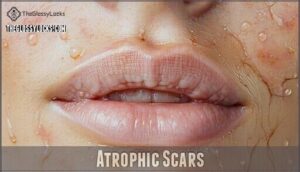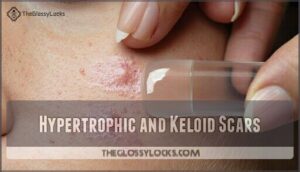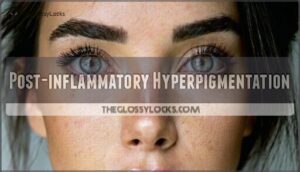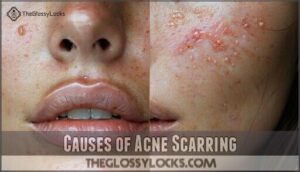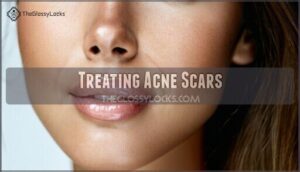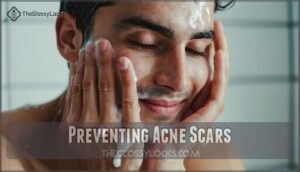This site is supported by our readers. We may earn a commission, at no cost to you, if you purchase through links.
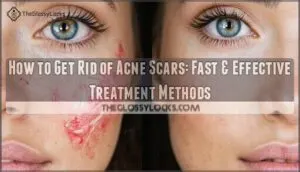
At-home options include retinoids, vitamin C serums, and consistent sunscreen use to prevent further damage.
The key is matching your treatment to your specific scar type—atrophic scars respond well to resurfacing procedures, while raised scars may need steroid injections or silicone sheets.
Most people see noticeable improvement within 3-6 months of consistent treatment, though deeper scars may require multiple sessions for ideal results.
Table Of Contents
- Key Takeaways
- Acne Scar Types
- Getting Rid of Acne Scars
- Causes of Acne Scarring
- Treating Acne Scars
- Preventing Acne Scars
- Frequently Asked Questions (FAQs)
- Can I remove acne scars naturally?
- Can acne scars actually go away?
- How to remove an acne spot?
- How do you make acne scars go away?
- Are acne scars permanent?
- Does vitamin C help with acne scars?
- What lifestyle changes can help prevent acne scars?
- Are certain diets effective for minimizing acne scars?
- Can stress contribute to the formation of acne scars?
- How do I choose products safe for sensitive skin?
- Conclusion
Key Takeaways
- Match your treatment to your scar type – Atrophic scars respond well to laser resurfacing and microneedling, while raised scars need steroid injections or silicone sheets for the best results.
- Professional treatments deliver faster results – Laser therapy, chemical peels, and microneedling can reduce scar appearance by 30-70%, with most people seeing noticeable improvement within 3-6 months.
- Prevention is your best strategy – Treat active acne promptly within 24-48 hours, avoid picking at blemishes, and use gentle skincare routines to prevent permanent scarring before it forms.
- Combine approaches for maximum impact – You will get better results using multiple treatments together, like pairing chemical peels with radiofrequency procedures, rather than relying on a single method.
Acne Scar Types
Before you can effectively treat acne scars, you’ll need to understand what type you’re dealing with since different scars require different approaches.
The three main categories include atrophic scars that create depressions in your skin, hypertrophic and keloid scars that appear raised above the surface, and post-inflammatory hyperpigmentation that leaves dark marks where acne once was.
Atrophic Scars
Atrophic scars create depressed areas in your skin where collagen loss has occurred during healing.
You’ll recognize three distinct types: ice pick scars appear as narrow, deep pinholes requiring specialized icepick treatment, boxcar scars form wider indentations with sharp edges needing boxcar reduction techniques, and rolling scars create an undulating rolling appearance across your skin’s surface.
Each scar depth determines your acne scar treatment approach for the best atrophic scars improvement.
Hypertrophic and Keloid Scars
Unlike their sunken counterparts, hypertrophic scars and keloidal scars rise above your skin’s surface like unwelcome guests at a healing party.
Your genetic predisposition plays a starring role in their formation, especially if you have darker skin.
Key characteristics of raised acne scars:
- Hypertrophic scars stay within original wound boundaries
- Keloidal scars extend beyond initial acne lesion
- Corticosteroid injections provide effective scar softening
- Silicone dressings apply beneficial scar pressure
- Keloid removal may require surgical intervention
Corticosteroids remain the gold standard for scar treatment.
These scars can be managed with silicone gel applications.
Post-inflammatory Hyperpigmentation
Dark patches that linger after acne heals aren’t true scars but postinflammatory hyperpigmentation (PIH).
This skin discoloration occurs when inflammation triggers excess melanin production, creating stubborn brown or black marks.
PIH causes include picking at blemishes and delayed acne treatment.
PIH treatments like chemical peels, retinoids, and vitamin C serums effectively address skin pigmentation issues.
PIH duration varies but typically fades within months with consistent PIH skincare routines and proper PIH prevention strategies.
Getting Rid of Acne Scars
The reality is that you can substantially reduce acne scars with today’s advanced treatment options, though complete elimination isn’t always possible.
Your journey toward smoother skin starts with understanding that different scar types respond better to specific acne scar treatments.
Laser resurfacing works exceptionally well for shallow scars, while microneedling stimulates collagen production for deeper marks.
Many dermatologists recommend combination therapies, pairing treatments like chemical peels with radiofrequency procedures for enhanced long-term results.
Don’t expect overnight miracles—effective scar treatment typically requires multiple sessions spaced weeks apart.
While you’re pursuing professional scar revision, preventative skincare helps prevent new blemishes that could worsen existing scarring.
Some patients explore scar camouflage techniques using specialized makeup during their treatment journey.
The key is patience and consistency with your chosen protocol, whether you opt for aggressive laser treatments or gentler approaches like topical retinoids combined with professional procedures.
Causes of Acne Scarring
Understanding what causes acne scarring helps you prevent permanent skin damage before it occurs. Several key factors determine whether your breakouts will leave lasting marks on your skin.
Inflammatory Acne
Inflammatory acne creates the perfect storm for scarring.
Deep inflammation triggers your skin’s scarring cascade, setting the stage for permanent damage.
When cystic acne and nodules form deep within your skin, they trigger intense acne inflammation that damages surrounding tissue.
This nodule damage destroys collagen fibers, making scarring severity directly linked to inflammation levels.
The deeper the inflammatory acne penetrates, the more likely permanent acne scars will form, emphasizing why early intervention matters for effective acne scar treatment.
Delayed Treatment
When you postpone acne treatment, you’re basically rolling out the red carpet for permanent scarring.
Don’t let acne overstay its welcome—delayed treatment practically guarantees permanent scarring.
Delayed treatment allows inflammatory lesions to penetrate deeper into skin layers, substantially increasing acne scarring severity and long-term effects on your complexion.
Here’s what happens when treatment gets pushed to the back burner:
- Scarring Timeline accelerates – Each untreated breakout extends the inflammatory process
- Treatment Efficacy decreases – Established scars become harder to eliminate completely
- Psychological Impact intensifies – Visible scarring affects self-confidence and social interactions
- Preventative Measures lose effectiveness – Early intervention becomes impossible once damage occurs
- Acne scarring risk multiplies – Chronic inflammation destroys healthy collagen structure permanently
Excessive Collagen Production
When your body overproduces collagen during healing, you’ll develop raised scars instead of smooth skin.
This collagen overproduction creates hypertrophic characteristics in scar tissue, appearing as thick, elevated bumps on your chest, back, or face.
Keloid formation represents the most severe type, where genetic factors drive excessive collagen production beyond the original wound boundaries, creating painful, itchy masses requiring specialized acne scar removal treatments.
Proper nutrition, including vitamins for scar, can also substantially impact healing.
Genetics and Skin Tone
Your genetic makeup and skin tone substantially influence your healing response and scarring severity.
Family history acts like a roadmap, showing you’re more likely to develop acne scars if relatives experienced similar issues.
Consider these genetic and skin tone factors:
- Genetic predisposition determines your collagen production patterns
- Darker skin tones face higher risks of hyperpigmentation treatment needs
- Skin types with melanin-rich pigmentation scar more prominently
- Family history predicts individual scarring patterns
- Healing response varies based on inherited collagen synthesis abilities
Treating Acne Scars
When acne leaves its mark, you don’t have to live with permanent reminders on your skin.
Professional treatments can substantially reduce scar visibility and restore smoother skin texture through targeted approaches that address different scar types.
Laser Resurfacing
Laser resurfacing delivers powerful scar reduction by precisely removing damaged skin layers and stimulating collagen production.
You’ll see 30-70% improvement in atrophic scars through fractional CO2 or ablative treatments, with results continuing to develop over six months as new collagen forms beneath the surface. The procedure promotes new skin cell formation by removing the old layers.
| Laser Types | Treatment Depth | Downtime Expectations |
|---|---|---|
| Fractional CO2 | Deep penetration | 7-14 days redness |
| Ablative Erbium | Moderate depth | 3-10 days healing |
| Non-ablative | Surface level | 1-3 days minimal |
| IPL/KTP | Superficial | Same day return |
| Fraxel | Controlled micro-zones | 5-7 days peeling |
Cost Analysis: Professional laser treatment ranges $500-3,000 per session. Risk Factors include temporary hyperpigmentation and infection potential, especially with deeper resurfacing methods targeting stubborn scarring.
Chemical Peels
Chemical peels utilize acids like glycolic, salicylic, and trichloroacetic acid for effective scar reduction through controlled skin resurfacing.
Peel strength determines treatment depth, with lighter peels requiring higher treatment frequency for gradual improvement.
Medium-depth peels target deeper acne scars but increase side effects risk.
Proper post-peel care prevents complications and maximizes dermatological procedures’ effectiveness.
They can also help improve skin texture and tone.
Microneedling
Microneedling creates controlled micro-injuries that trigger your skin’s natural healing response, boosting collagen production by up to 400%. This collagen induction therapy effectively treats atrophic acne scars through precise microneedling depth control.
Many people explore products for scar treatment to address this issue.
Key benefits include:
- Serum infusion enhancement through temporary microchannels
- Pain management with topical anesthetics during treatment
- Downtime expectations of 1-3 days with mild redness
- Home microneedling options available, though professional treatments deliver superior results for skin rejuvenation
Radiofrequency Skin Tightening
Radiofrequency skin tightening harnesses controlled thermal energy to stimulate collagen production deep within your skin.
This RF scar reduction technique delivers precise heat at specific treatment depths, triggering natural healing processes that smooth acne scars and improve skin texture improvement.
The radiofrequency treatment requires minimal recovery time compared to laser procedures, with procedure cost averaging $755 per session.
Many find that early acne treatment is the best way to avoid needing such procedures.
| Treatment Aspect | Details | Benefits |
|---|---|---|
| Sessions Required | 3-4 treatments spaced monthly | 50% median scar reduction |
| Collagen Stimulation | Gradual over 3 months | Progressive skin tightening |
| Side Effects | Mild redness, minimal downtime | Safe for all skin types |
| Cost Range | $582-$1,448 per session | Accessible compared to surgery |
Fillers and Injections
Dermal fillers offer your fastest route to smoother skin by instantly raising depressed scars.
Hyaluronic acid injections provide immediate results lasting 6-12 months, while Bellafill delivers semi-permanent correction for up to five years.
These injection types work best for atrophic scar tissue, improving skin texture improvement through strategic placement beneath indentations.
Procedure risks include temporary swelling and bruising, though serious complications remain rare with proper technique.
Preventing Acne Scars
While you can’t completely prevent acne scars once acne has formed, you can substantially reduce your risk through proper skincare and prompt treatment.
The key is addressing active acne before it causes permanent skin damage and following gentle care routines that support your skin’s natural healing process.
Gentle Skincare Routines
Your skin care routine forms the foundation for preventing acne scars. Gentle skincare with routine cleansing removes debris without irritation, while non-comedogenic products won’t clog pores.
Hydration importance can’t be overstated—moisturizers maintain your skin barrier.
Sun protection prevents darkening of existing marks. Avoid irritants like harsh scrubs that damage healing skin and worsen scarring potential.
Prompt Acne Treatment
While good skincare lays the groundwork for healthy skin, treating active acne quickly prevents lasting damage.
Early intervention substantially reduces your risk of developing permanent acne scars by controlling inflammation before it penetrates deeper skin layers.
Consider these treatment timeline priorities:
- Address inflammatory acne within 24-48 hours of onset
- Use anti-inflammatory treatments to reduce severity immediately
- Maintain consistent acne treatment for 6-8 weeks minimum
- Monitor skin response and adjust medications as needed
Prompt acne treatment directly correlates with scar prevention outcomes, and early intervention is crucial for preventing lasting damage and achieving good skincare.
Natural Remedies and Home Care
Natural remedies offer gentle alternatives for acne scar prevention and mild improvement.
Tea tree oil combined with aloe application reduces inflammation while honey benefits include wound healing properties.
Black seed oil may help even skin tone, and vitamin C serum promotes collagen production.
OTC peels with alpha-hydroxy acids encourage cell turnover. Rosehip oil treatment can also improve skin texture.
These home remedies support your skin care routine, though scientific evidence remains limited for treating established acne scars with natural remedies.
Emerging Therapies and Dermatological Consultations
Cutting-edge therapies are revolutionizing acne scar treatment through advanced technology and personalized approaches.
Board-certified dermatologists now offer innovative solutions that weren’t available just years ago, combining traditional methods like laser resurfacing and microneedling with breakthrough techniques.
- Future treatments include stem cell therapy and bioprinting technologies for scarless healing
- Personalized medicine tailors treatment plans based on your specific scar type and skin tone
- Clinical trials are testing nanotechnology applications for targeted scar repair
- Dermatology consultations now include thorough assessments using AI-powered imaging systems
Frequently Asked Questions (FAQs)
Can I remove acne scars naturally?
You can improve mild acne scars naturally using tea tree oil, aloe vera, and honey, which promote healing and reduce inflammation, though scientific evidence remains limited.
Can acne scars actually go away?
Actually, many acne scars can fade substantially with proper treatment, though complete disappearance isn’t guaranteed.
Professional treatments like laser therapy, chemical peels, and microneedling effectively reduce scar appearance by 70% or more.
How to remove an acne spot?
You can treat acne spots using targeted treatments like benzoyl peroxide or salicylic acid spot treatments, which reduce inflammation and bacteria. For faster results, see a dermatologist for corticosteroid injections.
How do you make acne scars go away?
Laser treatments, chemical peels, and microneedling stimulate collagen production to smooth depressed scars.
You’ll see gradual improvement over months with professional procedures, while dermal fillers provide immediate but temporary results for deeper indentations.
Are acne scars permanent?
Acne scars aren’t necessarily permanent. While they don’t fade completely on their own, you’ve got effective treatment options like laser resurfacing, chemical peels, and microneedling that substantially reduce their appearance.
Does vitamin C help with acne scars?
Like gentle rain nourishing parched earth, vitamin C serum helps fade acne scars by boosting collagen production and reducing hyperpigmentation.
You’ll see gradual improvement with consistent daily use over several months.
What lifestyle changes can help prevent acne scars?
Maintain gentle skincare routines, treat active acne promptly, avoid picking or squeezing pimples, eat anti-inflammatory foods, manage stress levels, get adequate sleep, and protect your skin from sun damage.
Are certain diets effective for minimizing acne scars?
While no specific diet directly eliminates existing acne scars, anti-inflammatory foods like omega-3 fatty fish, antioxidant-rich berries, and zinc-containing nuts support skin healing.
These foods may prevent future scarring when combined with proper treatment.
Can stress contribute to the formation of acne scars?
Research shows 75% of people experience increased acne breakouts during stressful periods.
While stress doesn’t directly create scars, it worsens inflammatory acne by triggering hormonal changes and immune responses.
Making you more prone to picking at blemishes, which increases scarring risk.
How do I choose products safe for sensitive skin?
Look for products labeled "fragrance-free," "hypoallergenic," and "non-comedogenic." Patch test new items on your inner arm for 24-48 hours before applying to your face to avoid reactions.
Conclusion
Absolutely transforming your skin might feel impossible when staring at stubborn acne scars, but you’ve got more power than you realize.
Learning how to get rid of acne scars requires patience, consistency, and the right approach for your specific scar type.
Professional treatments deliver faster results, while at-home care provides steady improvement over time.
Remember, your skin’s healing journey is unique, so work with a dermatologist to create a personalized treatment plan that matches your goals and budget, and requires a good understanding of professional treatments.
- https://pmc.ncbi.nlm.nih.gov/articles/PMC12046493/
- https://www.nhs.uk/conditions/acne/complications/
- https://www.theinkeylist.com/products/hyperpigmentation-scar-solution-routine
- https://my.clevelandclinic.org/health/diseases/21222-acne-scars
- https://www.healthline.com/health/skin-disorders/types-of-acne-scars

